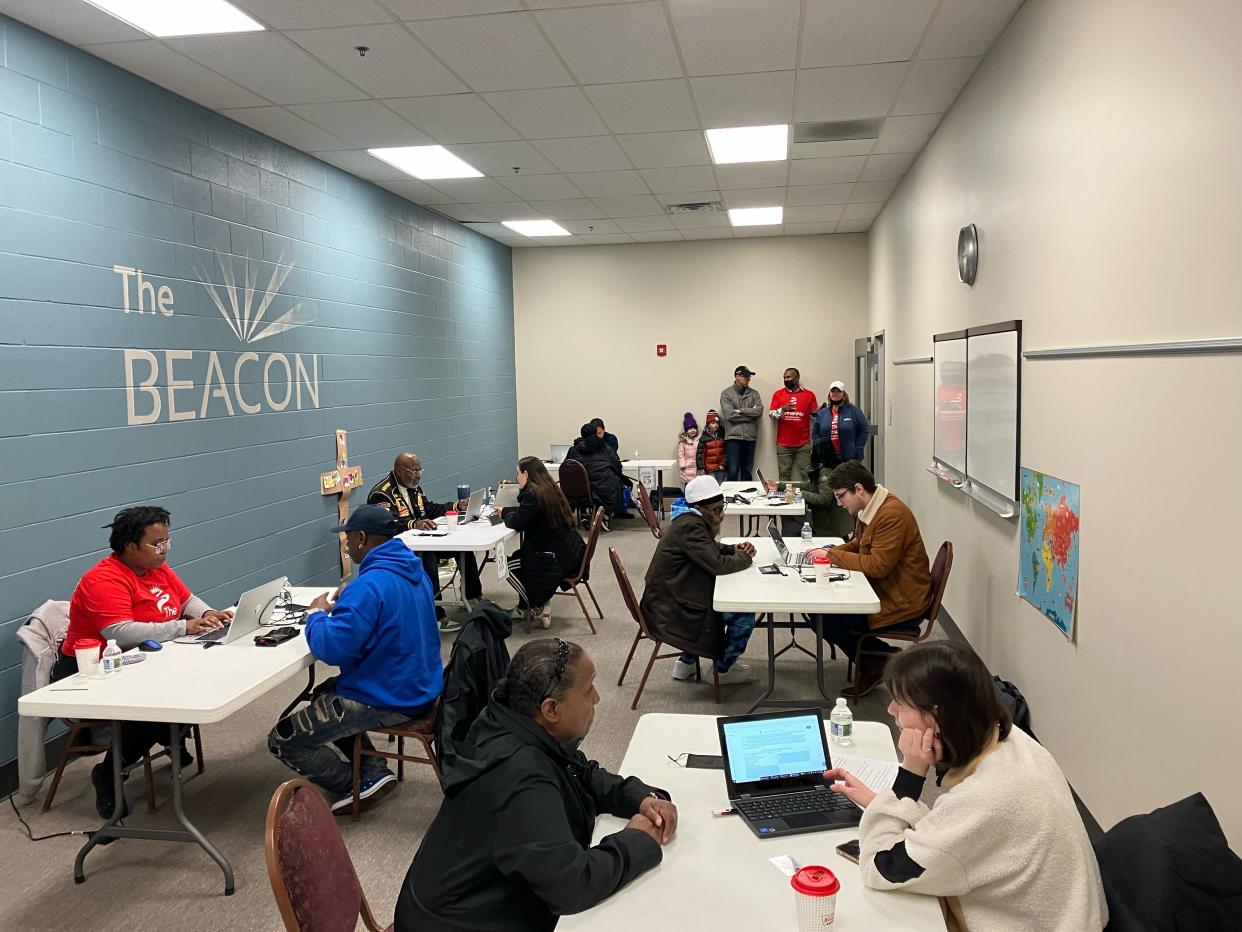Demand for expungements remains high as prosecutors, organizers aim for clean slates

SOUTH BEND — Local organizers say more than 200 people queued up in gymnasium of the Beacon Resource Center on Saturday hoping to wipe their slates clean through Indiana's expungement statute, commonly called the "Second Chance Law."
The law, in theory, allows people who have been convicted of a crime — but have served their sentence and waited a certain period of time — to seal their convictions. The statute's intent is to give formerly convicted people a better chance at finding jobs and housing, but it's a complex process that requires a lot of documentation and creates a barrier for many who would benefit from the law.
"It has brought complications in their lives," Beacon Resource Center Executive Director Jeff Walker said about those seeking assistance. "They’re used to hearing 'No.’”
More: Incarcerated Re-entry Center residents raise money to send 125 kids to South Bend Symphony
On Saturday, however, a team of 15 volunteers from Notre Dame Law School and attorneys from Barnes and Thornburg were on hand to help the process along, taking down information and creating 213 expungement petitions by the end of the day.
Those filings join the more than 1,200 expungement petitions filed in St. Joseph County since 2020 as organizers and officials work to keep up with the number of people seeking a clean slate.

"We gave people the chance to make their own lives better," said Andre Gammage, a former defense attorney and current circuit court magistrate in St. Joseph County, who helped organize the event.
That demand has also led St. Joseph County Prosecutor Ken Cotter to hire a new legal secretary to expedite the process. Last month, the St. Joseph County Council approved Cotter's request to transfer around $60,000 to pay the secretary's salary for 2023. Going forward, Cotter said he will ask for the dollars necessary to make the expungement secretary a permanent part of the prosecutor's office.
“We need to hold people accountable once they commit those crimes. But once they’ve paid their debt to society, they ought to be able to live their life," Cotter said. "Sometimes we forget those collateral impacts on individuals.”
From ambivalence to advocacy
Cotter was ambivalent towards the expungement process at first, but he changed his mind after a series of conversations with Gammage. The magistrate challenged Cotter to go through the expungement process himself as an exercize. When Cotter found it challenging to jump through the necessary hoops, he realized his office needed to do more to help those who had served their sentence.
In the beginning, only a few people came forward for help with the process. A spokeswoman for Cotter told The Tribune in 2019 that the prosecutor's office received two to three expungement petitions a week and a few advocacy groups held clinics that drew 20 or so people.
Based on that level of participation, the prosecutor's office gathered a handful of Notre Dame law school volunteers in 2020 and organized an expungement clinic at a local church. Cotter said they expected 20 people to show up, but were blown away when 400 people had gathered around the church before the doors even opened.
"We were there past midnight," Cotter recalled. "The last 200 we couldn't even try to help. We took their information; we went and bought scanners and scanned their information in."
Over the course of one month in 2020, Cotter and his deputies helped file 1,148 expungement petitions — a number so large, it took most of 2021 for the courts to process them all. In late 2022, another series of clinics generated 120 petitions to go along with the 213 started just last weekend.
That number of people seeking expungements is unprecedented in Indiana, Gammage and Walker said, and they believe that's due to the prosecutor's office being so involved.
Beyond the clean slate for individuals convicted of a crime, Gammage sees expungements as a benefit to society and a deterrent to crime because people with better jobs and living conditions are less likely to become repeat offenders.
”This is the right thing to do not only for those individuals, we owe it to them because they paid their debt, we owe it to the community," he said.
Now, large crowds seeking expungements don't phase organizers like Walker and Gammage. On Saturday, the pair said they were prepared with more volunteers, who had laptops and scanners ready to make the process paperless. And instead of standing in line, participants met with representatives from the BMV, Goodwill and local food banks while they waited their turn, Walker said.
“The Beacon organization, particularly, is just really passionate about our formerly incarcerated men and women," Walker added. "Seeing them get connected with jobs and resources and housing and just being able to have opportunities to get their lives back on track is great."
What to know about expungements
When a court expunges a conviction, it is deleted from the court system records that potential employers and landlords check, however the expungement is still viewable by officers of the court and law enforcement.
Those convicted of a sex crime or certain high-level felonies are not eligible for expungements, though convictions for most other offenses are with variable wait periods that increase with the severity of the crime.
Expungements can be granted five years after a conviction for a misdemeanor or a Class D felony that was reduced to a misdemeanor, and eight years after conviction for a Class D felony or three years after sentencing has been completed.
For all other felonies, except those for serious bodily injury, the waiting period increases to eight years after completion of a sentence, rather than after the conviction. For convictions involving serious bodily injury, the waiting period is 10 years.
A person can seek an expungement only once in their lifetime, but they can seek expungement of an unlimited number of convictions in that one application.
An expungement application may include convictions from only one county, so individuals with convictions in multiple counties must choose which conviction(s) they wish to seal.
If an applicant meets the criteria in the statute, judges are required to grant an expungement for low-level felonies but have some discretion when it comes to more serious felonies.
Prosecutors also have discretion to waive waiting periods, which Cotter said his office is open to doing in most cases not involving violent crimes.
To get the ball rolling, anyone seeking an expungement should gather information about the offense(s) they wish expunged (what was the offense, when/where did it happen) along with their personal information and send it to the prosecutor's office. The legal secretary will then run a background check on applicants and send the petition to a defense attorney for a more streamlined filing process.
Of the petitions received in 2020, data from the prosecutor's office shows around 35% were expunged, and 22% were sent to Indiana Legal Services because they included convictions from different counties. Roughly 42% of requests did not meet the statute's criteria.
Cotter hopes St. Joseph County becomes a model for other counties in the state, given how complex the process is.
"If they have it as a right, why not try to be a part of it as opposed to being a roadblock?" Cotter said.
Email Marek Mazurek at mmazurek@sbtinfo.com. Follow him on Twitter: @marek_mazurek
This article originally appeared on South Bend Tribune: Demand for expungements remains high in St. Joseph County as officials ease process

